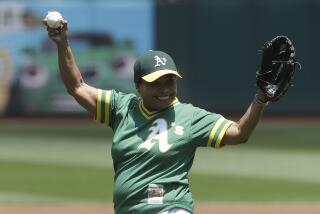Still None of L.A.’s Business?
- Share via
It is ironic as it is revealing, both about the man and the game he ruled with an iron-fisted detachment.
One of the most successful commissioners in the history of sports will be best remembered as having little use for his actual sport.
Paul Tagliabue turned the NFL into the richest league in the world, yet did you ever see him actually holding a football?
He help build countless new stadiums, yet did you ever see him standing on a field?
He helped discipline and diversify a culture of our most famous athletes, yet was rarely seen talking to any of them. If he actually attended games, you never knew. If he actually liked them, you always wondered.
He spent more than 16 years selling a league that became a $5.7-billion industry, yet we never saw him even clap.
“He didn’t do things for brotherhood,” sports sociologist Dr. Harry Edwards said admiringly. “He did them for business.”
That is why Tagliabue, who announced his retirement Monday, will leave the NFL as the richest league in the world.
And that is why that league doesn’t play in Los Angeles.
As much as Tagliabue pushed for a return to this marketplace, his owners were always making too much money to care.
As much as Tagliabue wanted the most recent expansion franchise to end up here instead of Houston, the locals didn’t have enough money to compete.
Tagliabue knew the NFL would one day need L.A.
He even said, in a conference call Monday, that his greatest regret was allowing the Rams and Raiders to leave town.
But he did such a good job making so much money without it, the owners never quite believed him.
“He handled the situation there as best he could,” said sports economist Andrew Zimbalist. “He cared about L.A., and did all he can.”
And now that he has finally figured out a way to make it happen, now that he has enough strength to convince owners to restore the Coliseum and perhaps even buy a team to move there?
Well, that gives L.A. four months, until he officially leaves in July, to make things happen.
“We have a window here, and we’re going for it,” said Pat Lynch, Coliseum general manager. “We’re going to take his retirement as something that will put pressure on getting the deal done. We know Paul is pro-L.A., and we know this can happen before he leaves.”
But if it doesn’t?
Well, if his replacement is another New York-centric business type, L.A. could disappear again.
Remember, in the beginning of this process, Tagliabue couldn’t even pronounce the name of our city correctly and, dude, it ain’t that hard.
He would call it “Los Ang-e-lees,” as if we were a pair of blue jeans, the kind that sit crumpled at the foot of the bed, just begging to be worn.
In the beginning, he thought that, like every other town in America, Los Angeles would sell its soul for football.
He learned that we look at sports as entertainment, not oxygen.
He also thought that, like every other town in America, Los Angeles had a host of billionaire suckers who needed to own a football team to make them feel cool.
He knows now that, this being Hollywood, our rich people already know they’re cool.
It was the biggest mistake of his regime that he and associates initially didn’t spend more time in Los Angeles to understand the landscape.
But he didn’t make many others.
“He was a good steward, he pulled together 32 owners who have big egos and are arrogant and difficult,” Zimbalist said. “And then into that mix he brought the union, an even more difficult job.”
Indeed, while other major American sports leagues were walking picket lines, Tagliabue ensured that the NFL, alone, did not.
While other major sports leagues fought for television dollars, Tagliabue sold his programming for billions.
And while organizations like Major League Baseball still struggle with issues like diversity in management, Tagliabue not only supported it, he made it a league rule.
When he became commissioner in 1989, there was only one African American head coach. Today, there are six.
It’s still not a large figure considering more than 70% of the league’s players are African American, but it’s improving.
“There were always phenomenal forces working against him,” said Edwards. “But he has managed as well as he can manage that which he could not eliminate.”
He publicly condemned a breast-flashing Janet Jackson, a mooning Randy Moss and players whose socks didn’t match.
He never showed a rooting interest in the game, but always in the business, and for fans who just wanted to watch their favorite team every Sunday without distraction, that was enough.
Paul Tagliabue wasn’t the salesman that his predecessor Pete Rozelle was. But quietly, he accomplished more.
“Tagliabue worked behind the scenes, behind the curtain, but always ended up with something great on stage,” Edwards said.
The folks at the Coliseum are hoping that his last act is his best.
Those L.A. fans who actually care about the return of the NFL would be wise not to get their hopes up.
After all, as Paul Tagliabue taught us, it’s just business.
Bill Plaschke can be reached at bill.plaschke@latimes.com. To read previous columns by Plaschke, go to latimes.com/plaschke
More to Read
Go beyond the scoreboard
Get the latest on L.A.'s teams in the daily Sports Report newsletter.
You may occasionally receive promotional content from the Los Angeles Times.











